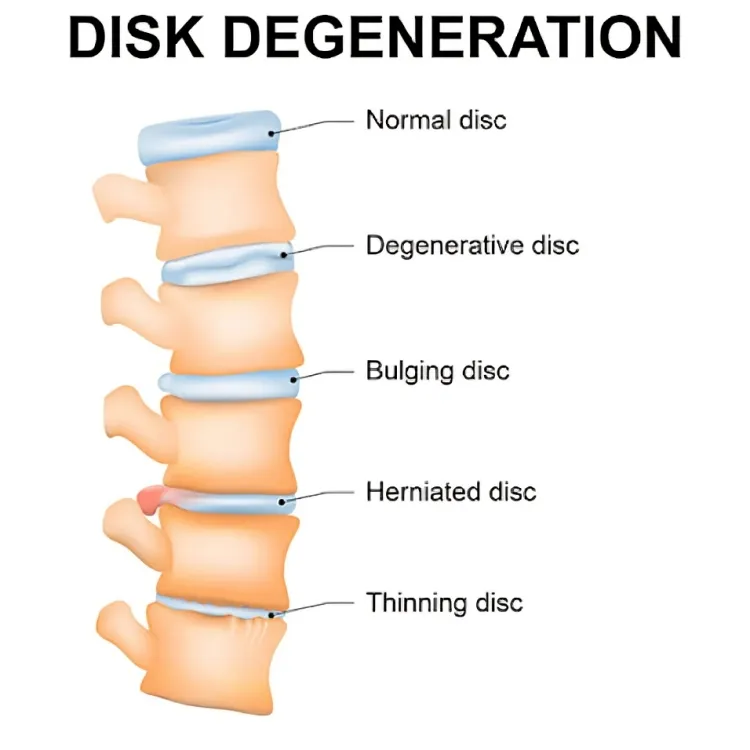From Diagnosis to Treatment: Your Journey with Brain Clots
Introduction: Dealing with brain clots can be a frightening and confusing experience. From the initial diagnosis to exploring treatment options, navigating this...

Degenerative Disc Disease (DDD) refers to the wear and tear of the spinal discs, which act as cushions between the vertebrae. As we age, these discs can lose their flexibility, elasticity, and shock-absorbing capabilities, leading to pain, discomfort, and reduced mobility. Factors such as genetics, lifestyle, and injury can influence the onset and severity of DDD. Understanding its symptoms and seeking timely medical advice is crucial for managing the condition effectively.
Maintaining good posture is essential for spinal health and can significantly impact the prevention and management of conditions like Degenerative Disc Disease. Proper posture ensures the spine is aligned and balanced, reducing undue stress on the spinal discs and preventing their premature degeneration. Incorporating posture-correcting exercises and being mindful of body positioning during daily activities can help preserve spinal health and mitigate the risk of developing spinal issues.
Core Strength: Focus on exercises that build core muscles, providing better support for the spine.
Low Impact: Engage in low-impact activities like swimming or cycling to reduce strain on the spine.
Consistency: Regular exercise, even in short sessions, can significantly improve spinal health.
Professional Guidance: Consult a physical therapist for exercises tailored to your needs and capabilities.
Hydration plays a pivotal role in spinal health, particularly in maintaining the integrity of spinal discs. These discs, which cushion the vertebrae, rely on water to retain their shape and elasticity. Adequate hydration ensures that these discs remain well-lubricated, reducing the risk of disc shrinkage and degeneration, which can lead to back pain and reduced mobility.
Water also facilitates the transport of essential nutrients to spinal tissues, supporting their maintenance and repair. The importance of hydration extends beyond just spinal health; it is crucial for overall bodily functions. However, in the context of the spine, maintaining optimal hydration levels can significantly contribute to preserving the spine's structural integrity and function.
The relationship between body weight and spinal health is significant, as excess weight can exacerbate the wear and tear on spinal discs, leading to accelerated degeneration. The spine is designed to support a certain amount of weight, and when this limit is exceeded, it can result in increased pressure on the spinal discs. This additional pressure can cause the discs to deteriorate more quickly, potentially leading to conditions such as degenerative disc disease.
Managing body weight through a balanced diet and regular exercise can alleviate some of this pressure, reducing the risk of spinal issues and contributing to overall spinal health. Weight management is not just about aesthetics; it is a crucial component of maintaining musculoskeletal health, especially for the spine.
Calcium and Vitamin D: Consume dairy products, leafy greens, and fortified foods to strengthen bones.
Anti-inflammatory Foods: Include turmeric, ginger, and omega-3 rich foods like fish and nuts to reduce inflammation.
Hydration: Drink plenty of water to maintain disc elasticity and height.
Balanced Diet: Ensure a well-rounded diet to support overall health and weight management, reducing stress on the spine.
Ergonomics focuses on designing workspaces that align with the human body's natural posture, significantly reducing the risk of strain and injury to the spine. A spine-friendly workspace incorporates adjustable chairs and desks to ensure the spine remains in a neutral position, reducing pressure on spinal discs.
Proper monitor height and keyboard placement also contribute to maintaining a healthy posture, preventing the forward-leaning posture that can lead to chronic back problems. Incorporating ergonomics into the workspace is a proactive approach to safeguarding spinal health.
Stress has a profound impact on spinal health, manifesting physically in the form of muscle tension and pain, particularly in the back and neck. Chronic stress can lead to persistent muscle tightness, putting undue pressure on the spine and exacerbating conditions like degenerative disc disease. Effective stress management techniques, such as mindfulness, exercise, and adequate rest, can mitigate these effects, promoting muscle relaxation and reducing the overall strain on the spine. Managing stress is not only vital for mental health but also for maintaining the structural integrity of the spine.
Regular medical check-ups are essential in monitoring spinal health and detecting potential issues early. These check-ups allow healthcare professionals to assess the spine's condition and identify any changes or abnormalities that may indicate the onset of conditions like degenerative disc disease. Early detection through these evaluations can lead to more effective management strategies, potentially preventing further deterioration and preserving spinal function.
The future of spinal health looks promising with ongoing advancements in medical technology and a stronger emphasis on preventative care. Innovations such as minimally invasive surgical techniques, regenerative medicine, and personalized treatment plans are set to transform spinal care.
Preventative strategies, including public education on spinal health, ergonomic practices, and early intervention programs, are becoming increasingly important in reducing the incidence of spinal disorders and improving quality of life for individuals with spinal conditions.
The approach to Degenerative Disc Disease treatment in India has evolved significantly, with advancements in medical technology and expertise leading to more effective management and care. The country's healthcare sector, particularly in the realm of neurosurgery, is well-equipped to offer comprehensive treatment options for those suffering from spinal conditions.
Furthermore, the role of expert medical professionals cannot be overstated. The best neurosurgeons in India contribute significantly to the field, employing their expertise to not only treat but also to innovate in the management of spinal conditions. Their commitment to patient care and their continuous pursuit of knowledge in spinal health underscore the importance of choosing experienced specialists for complex conditions like Degenerative Disc Disease.
Partager cet article